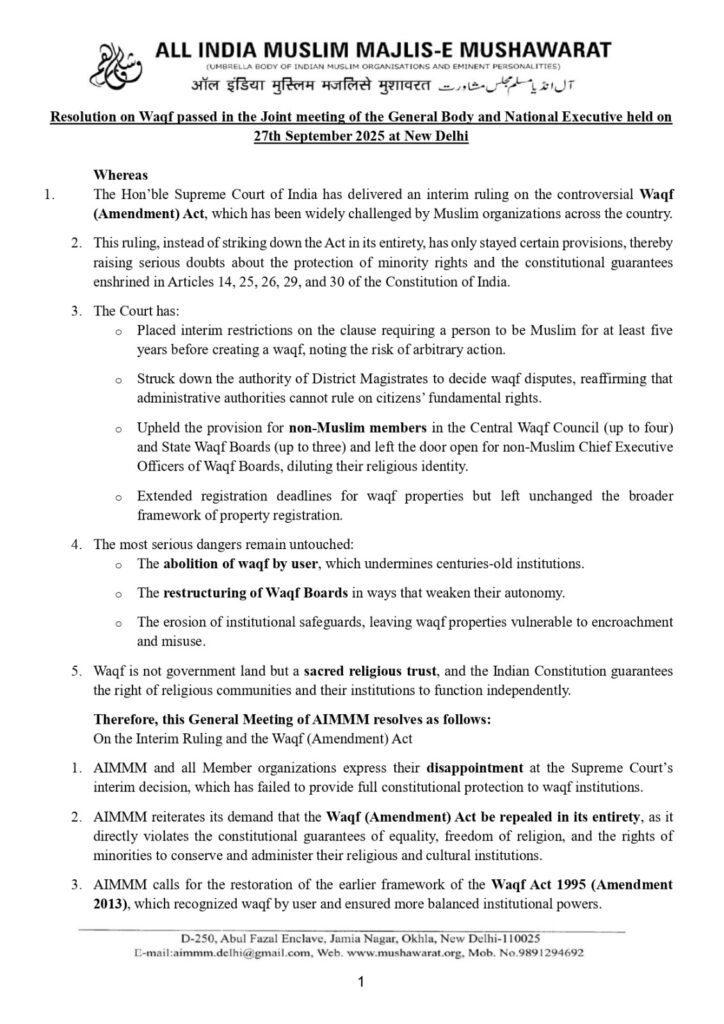
Whereas
- The Hon’ble Supreme Court of India has delivered an interim ruling on the controversial Waqf (Amendment) Act, which has been widely challenged by Muslim organizations across the country.
- This ruling, instead of striking down the Act in its entirety, has only stayed certain provisions, thereby raising serious doubts about the protection of minority rights and the constitutional guarantees enshrined in Articles 14, 25, 26, 29, and 30 of the Constitution of India.
- The Court has:
- Placed interim restrictions on the clause requiring a person to be Muslim for at least five years before creating a waqf, noting the risk of arbitrary action.
- Struck down the authority of District Magistrates to decide waqf disputes, reaffirming that administrative authorities cannot rule on citizens’ fundamental rights.
- Upheld the provision for non-Muslim members in the Central Waqf Council (up to four) and State Waqf Boards (up to three) and left the door open for non-Muslim Chief Executive Officers of Waqf Boards, diluting their religious identity.
- Extended registration deadlines for waqf properties but left unchanged the broader framework of property registration.
- The most serious dangers remain untouched:
- The abolition of waqf by user, which undermines centuries-old institutions.
- The restructuring of Waqf Boards in ways that weaken their autonomy.
- The erosion of institutional safeguards, leaving waqf properties vulnerable to encroachment and misuse.
- Waqf is not government land but a sacred religious trust, and the Indian Constitution guarantees the right of religious communities and their institutions to function independently.
Therefore, this General Meeting of AIMMM resolves as follows:
On the Interim Ruling and the Waqf (Amendment) Act
- AIMMM and all Member organizations express their disappointment at the Supreme Court’s interim decision, which has failed to provide full constitutional protection to waqf institutions.
- AIMMM reiterates its demand that the Waqf (Amendment) Act be repealed in its entirety, as it directly violates the constitutional guarantees of equality, freedom of religion, and the rights of minorities to conserve and administer their religious and cultural institutions.
- AIMMM calls for the restoration of the earlier framework of the Waqf Act 1995 (Amendment 2013), which recognized waqf by user and ensured more balanced institutional powers.
On Protection and Empowerment of Waqf Boards
- AIMMM demands that Waqf Boards be given powers of summary eviction—similar to those available to Hindu Temple Boards—so that encroached properties can be reclaimed without delay once a lawful order is issued.
- AIMMM calls for strengthening Sections 54 and 55 of the Waqf Act 1995, making them more stringent and effectively enforceable to secure immediate removal of illegal occupants.
- AIMMM further demands that laws be enacted against individuals—including politicians and government officials—who misuse waqf properties for personal or political gain, ensuring accountability and deterrence against any form of tampering with this sacred trust.
On Constitutional Safeguards and Minority Rights
- AIMMM asserts that the provisions allowing non-Muslim members and CEOs dilute the religious character of waqf institutions and therefore must be reversed in the interest of preserving the autonomy of religious endowments.
- AIMMM emphasizes that any framework for waqf must be built upon Articles 29 and 30 of the Constitution, ensuring that minorities retain their right to manage their institutions without external interference.
Concluding operative:
This General Meeting declares that the struggle to safeguard waqf is not only about property but about the religious identity, cultural survival, and constitutional rights of the Muslim community in India. AIMMM, in unity with all Muslim organizations, resolves to continue its peaceful, democratic, and legal struggle until the Waqf (Amendment) Act is repealed and a framework is established that truly protects the sanctity, autonomy, and survival of waqf in India.
Proposed by: Mr. Feroze Ahmad (Advocate), President, AIMMM
